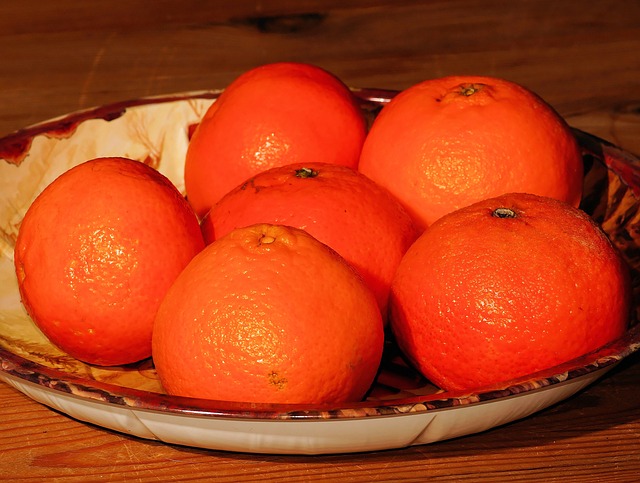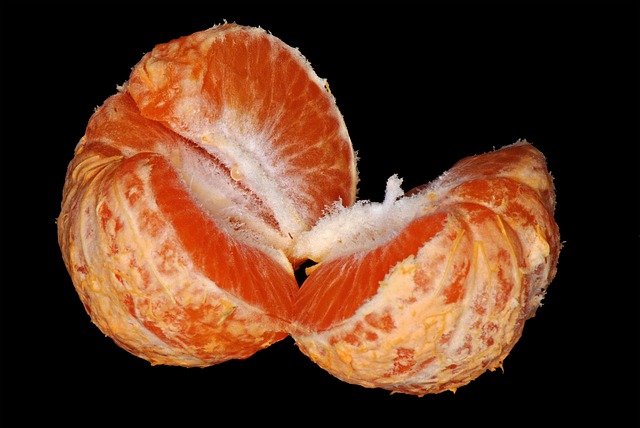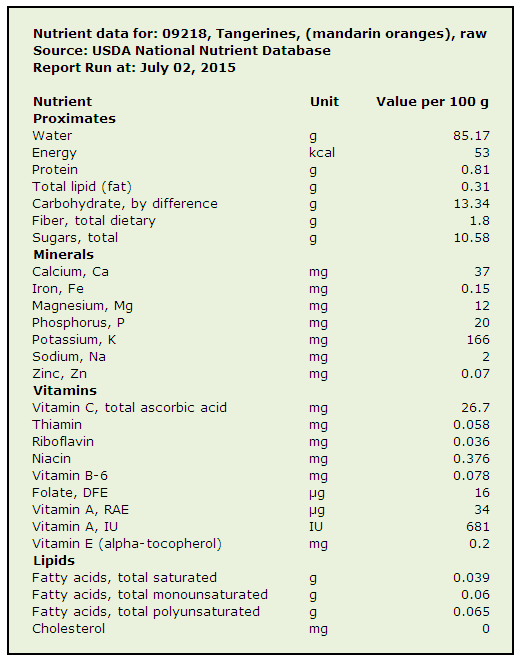Tangerine: Origins - Consumption - Nutrition Facts - Health Benefits
|
|
|
Contents
- Geographic origin and regions grown
- History of consumption
- Common consumption today
- Nutrition Facts: Vitamins, minerals and phytochemical components
- Health Benefits: Medicinal uses based on scientific studies
- Bibliography
Geographic Origins and Regions Grown

It is believed that tangerines originated in Southeast Asia. They now grow throughout the world.
History of Consumption
The tangerine (Citrus reticulata) is an orange or red colored citrus fruit. They are smaller than most oranges and the skin of some varieties peels off more easily. The taste is often more sour or tart, than that of an orange. Good quality tangerines will be firm to slightly hard, heavy for their size, and pebbly-skinned without deep grooves, as well as orange in color. Peak tangerine season is short, lasting from November to January in the Northern Hemisphere.
Tangerines have different numbers of seeds in each segment, with some tangerines having up to 59 seeds. The tangerine was given its name from Tangier, Morocco. Tangerines were shipped from ports in Tangier to various parts of Europe.
The Honey tangerine, originally called a Murcott, is very sweet, as its name suggests. Other popular kinds of tangerines include the Sunburst and Fairchild. One of the oldest and most popular varieties is the Dancy tangerine, but it is no longer widely grown. The Dancy was known as the zipper-skin tangerine and also as the kid-glove orange for its loose, pliable peel.
The peak season for tangerines is December so children often receive tangerines in their stockings around Christmas time. A popular alternative to tangerines are clementines, which are also a variant of the mandarin orange.
Common Consumption Today
Tangerines are often used in salads, to make vinaigrette, to top pancakes or other baked goods, or added to smoothies. Fresh tangerines are added to yogurt, cakes, salads, desserts, and main dishes. They are also used to make jellies, jams, and marmalade. Tangerine juice is often added to bottled juices, Gatorade, and multivitamin beverages. Tangerines are, however, most commonly eaten raw.
Nutrition Facts: Vitamins, Minerals and Phytochemical Components

Tangerines contain vitamin B1, B2, B3, C, folate, beta-carotene, potassium, and magnesium. See the following table for full details...

Health Benefits: Medicinal Uses Based on Scientific Studies
Tangerines have the same compounds and health benefits as many other citrus fruits like clementines. One serving of clementines or tangerines supplies a full day's supply of vitamin C (1). Unfortunately, only about one-half of adults consume the recommended amount of vitamin C daily.
Vitamin C is an antioxidant that has many functions such as the promotion of healthy skin and gums. When vitamin C is consumed at the same time as an iron source that is not necessarily meat, the vitamin C has the ability to increase iron absorption into the body (1).
Tangerines are a good source of folate which helps strengthen healthy red blood cells. Folate has many health benefits including the reduction of neural tube birth defects during pregnancy (2). Folate also helps produce and maintain new somatic cells. This is especially important during periods of rapid cell division and growth such as during infancy and pregnancy.
Folate is needed by the body to make DNA and RNA, which are the building blocks of cells. It also helps prevent changes to DNA that may lead to cancer. Both adults and children need folate to make normal red blood cells and prevent anemia. Folate is also essential for the metabolism of homocysteine and helps maintain normal levels of this amino acid (4).
Clementines and tangerines contain about as much potassium as a banana. Clementines and tangerines are also low in sodium so a diet that includes them may reduce the risk of high blood pressure and stroke (3),(4).
Bibliography
1. Akhilender-Naidu K. (2003) Vitamin C in human health and disease is still a mystery? An overview. Nutrition Journal, 2:7.
2. Christensen B, Rosenblatt DS. (1995) Effect of folate deficiency on embryonic development. Review. Baillieres Clinical Haematology, 8(3):617-37.
3. Harvard Medical School Health Guide. (2007) Potassium lowers Blood Pressure. Retrieved December 8, 2007 from http://www.health.harvard.edu/fhg/updates/update0705c.shtml
4. National Institute of Health, Office of Dietary Supplements. (2007) Dietary Supplement Fact Sheet: Folate. Retrieved Decemeber 8, 2007 from http://dietary-supplements.info.nih.gov/factsheets/folate.asp
Disclaimer
Nutritiousfruit.com provides this website as a service. Although the information contained within the website is periodically updated, no guarantee is given that the information provided is correct, complete, and/or up-to-date. The materials contained on this website are provided for general information purposes only and do not constitute legal or other professional advice on any subject matter. Nutrtiousfruit.com does not accept any responsibility for any loss, which may arise from reliance on information contained on this website. The information and references in this website are intended solely for the general information for the reader. The content of this website are not intended to offer personal medical advice, diagnose health problems or to be used for treatment purposes. It is not a substitute for medical care provided by a licensed and qualified health professional. Please consult your health care provider for any advice on medications.
Didn't find what you were looking for? Search here...

Amazon Search Box:
Did you like this page?
|
|
|




